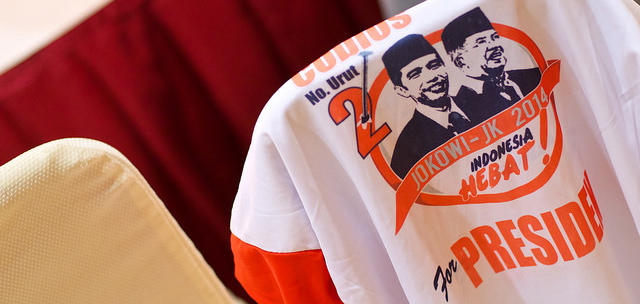Indonesian Democracy Takes Major Step Forward as Jokowi Declared Winner

With the announcement that Joko Widodo has won the recent presidential election, Indonesiaʼs young democracy has taken a major step forward. Despite the prospect of some unrest, the election marks the first transfer of power between two directly-elected presidents and bodes well for the future.
Background
Indonesiaʼs democracy has taken a major step forward after the electoral commission announced on 22 July that former Jakarta governor, Joko Widodo, had won the 9 July election. The result was expected after “quick counts” had earlier showed a win for Mr Widodo, widely known as Jokowi. While his political rival, Prabowo Subianto, has refused to accept the decision, claiming that the electoral commission has violated the law, his options remain limited after he announced that he would not make a constitutional challenge. Though there may be some social unrest, the result is a major victory for Indonesiaʼs nascent democracy, especially as it moves further away from the old political order and the authoritarian rule of former president Suharto.
Comment
The electoral commission confirmed that the former furniture exporter had won by a margin of three per cent, or a total of about 8.4 million votes. It marks a major step forward for the worldʼs third-largest democracy and is the first transfer of power between two directly-elected presidents, with outgoing President Susilo Bambang Yudhoyono set to step down in October having served his two-term constitutional limit.
Sporting a traditional batik shirt and his trademark smile, Jokowi gave a late-night victory speech at Sunda Kelapa, a port for old-style sailing vessels near the cityʼs former Dutch colonial heart. ʻThe election has led to a new optimism for the country … the heart of freedom and political responsibility is blooming with the new generation,ʼ he said. He went on to declare that, with mutual co-operation, Indonesia could ʻdevelop into one of the great civilisations of the future.ʼ
Jokowiʼs victory is a landmark achievement for Indonesiaʼs democracy, which is still one of the youngest in the world. But it will still have to move past its discordant politics. Earlier that day, Jokowiʼs political rival, Prabowo Subianto, had thrown the count into chaos, announcing at the eleventh hour that he would be withdrawing from the process. Yet, instead of simply conceding defeat, the 62-year old refused to accept the electoral commissionʼs results. Having voiced contempt for the countryʼs democratic processes in the lead- up to the election, Prabowo claimed that there had been ʻmassive, structured and systematic fraud,ʼ before adding that election was ʻnot democraticʼ and the countryʼs constitutional rights had been ʻrapedʼ.
His withdrawal caught observers by surprise. Most had expected him to lodge an appeal with the Constitutional Court, which was then expected to hand down its verdict by 24 August. But, with any challenge unlikely to alter the overall result, Prabowo decided to reject the vote completely, hoping to discredit the process and Jokowiʼs victory. Having withdrawn as a presidential candidate, he also exhausted his right to lodge a constitutional challenge. [Editor’s note: Mr Prabowo’s team has now clarified that he did not pull out of the election entirely, only from the formal counting process, and still considered himself a candidate for president which gives him standing to appeal to the court].
His aim of discrediting the electoral process is unlikely to work. Indonesiaʼs democracy may not be perfect, but the recent election was relatively peaceful and incident-free. Moreover, the 70% turnout figure – more than most elections in the United States and the United Kingdom – confirms that Indonesians have firmly embraced democracy and are clearly unwilling to see the political system undermined.That sentiment was echoed in a recent survey that found that 93% of respondents wanted Prabowo to concede. Whether he does remains to be seen, especially given that the recent election is likely to have been his last chance to become president. He could try to incite protests and unrest in the hope of derailing the process. Already, however, his support is beginning to dwindle, with his vice-presidential running mate, Hatta Rajasa, accepting the electoral commissionʼs result. There has also been a large police contingent on the ground and the outgoing government will be sure to crack down on any disorder. That should leave Prabowo with few options but to go quietly, a stark contrast to the rousing rallies of his campaign.
For Jokowi, meanwhile, there will be little time to celebrate. He may not take office until 20 October, but he will face a host of pressing challenges. Addressing these issues will be made all the more difficult by the fact that the countryʼs fractious parliament has a poor record of passing vital reforms and legislature. But for the people of Indonesia, another successful election, this time of an everyman far removed from the usual political élites, may be more than enough reason to rejoice.
Andrew Manners is a research analyst at the Indian Ocean Research Programme. He can be reached at amanners@futuredirections.org.au.
This article was originally published by Future Directions International. It is republished with permission.


